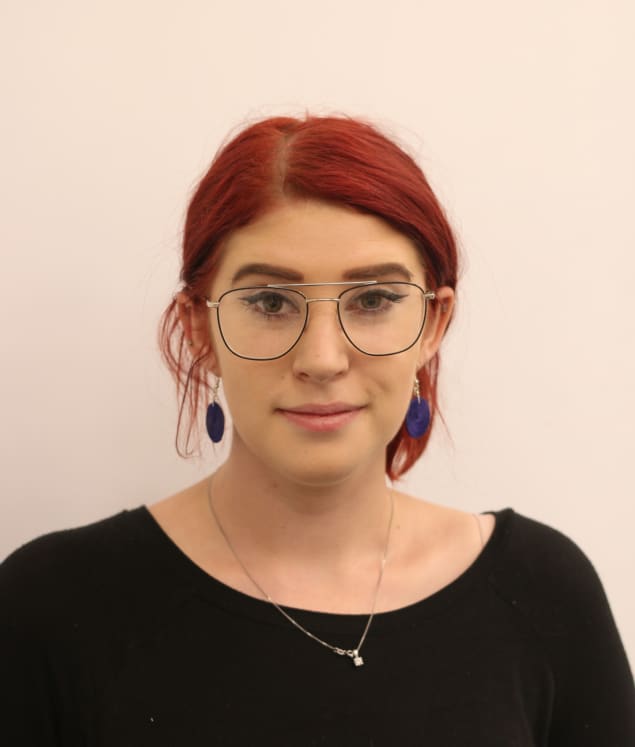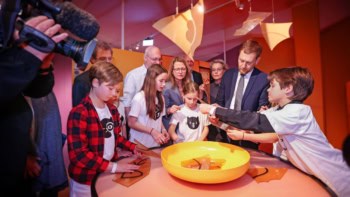Perdi Potgieter is a research scientist at the National Physical Laboratory (NPL), UK. She has followed an unconventional route into physics, having left school at 16 to start an apprenticeship at NPL in 2015, and she is now a fully fledged scientist working in NPL’s mass team. In 2019 the Women’s Engineering Society chose her as one of the top 50 women in engineering. She speaks to Laura Hiscott about her work at NPL and taking an untrodden path

What projects do you work on at NPL?
I split my time between two areas, one being the Kibble balance project and the other being measurement services. The Kibble balance is an instrument that has been designed to generate a standard mass by comparing virtual electrical and mechanical power. It will allow the SI unit of mass to be defined in terms of very accurate quantum electrical units: the Josephson voltage and quantum Hall resistance, with relation to the fixed numerical value of the Planck constant.
What specific tasks do you do?
Within the Kibble balance project, I have my own smaller projects to focus on, one of which is a low-thermal electromotive force (EMF) switching system. The aim of this is to minimize electrical errors due to the generation of thermal EMFs from the small temperature differences that exist in critical parts of the wiring of the apparatus. Tasks on this project include working with manufacturers to design a bespoke switch, prototyping and designing a test rig, and testing isolation and latching forces.
Are these the same kinds of tasks done by people who have done a degree in physics?
It is important to remember that we are all part of a team, and each of us has our unique skills and talents. I enjoy the practical aspects, such as soldering and building pieces of equipment. When it comes to maintaining the UK mass scale, we are all responsible regardless of the level of qualification each person has. I am incredibly lucky to work in a team where the attitude has always been “if you can do something, then do it. If you want to learn, give it a go”. If you can help, there will always be something for you to do. When you’re asked to do something, no one is asking how many years you spent in education; they’re asking what your skills are.
I have found I can try a lot of things and learn as I work. Naturally, there are some tasks that I can’t do, which people on the team with a degree can. Likewise, there are tasks that I can do, that others with a degree can’t. I am proud of my practical skills, which come from being in the department for six years. I know a lot more about some of the specifics of my department than someone with a degree, although they will know more about physics than me. I don’t think this makes one of us better than the other, just different, which is never a bad thing.
How have you developed the skills and knowledge required for your job that many people in science and engineering careers get from university?
I can comfortably say I have a lifetime of learning to do. I’m part of such a supportive team of people who enable my development and allow me to get involved in different projects. A lot of what I’m doing now, I wouldn’t have known even if I did go to university, as it is such a niche job. There aren’t many labs around the world where you will be dealing with the national standards. I enjoy learning so I ask a lot of questions, which has helped improve my knowledge. I have learnt lots of skills through trying and undertaking various activities in my day-to-day job.

12 things we learned about the National Physical Laboratory
Do you find any advantages or disadvantages in having gone straight from school into your career, compared with going through university?
I am now doing a degree through The Open University in electromechanical engineering and I’m enjoying it. Doing the apprenticeship and working in industry has helped me to solidify what career I want and what sector I want to work in. The practical experience has been invaluable and helps me put theoretical work in perspective. It is great that I can say at 23 that I have almost seven years of industry experience. I wouldn’t be as far in my career if I had gone to university, although now I have the opportunity to do my degree through The Open University funded by NPL. Despite my great experience of the apprenticeship, I do think a degree is a good and important qualification and I can now bring my academic skills in line with my practical skills. Doing a degree at 18 isn’t for everyone and the route I’m doing has worked fantastically for me, but wouldn’t necessarily work as well for others.


